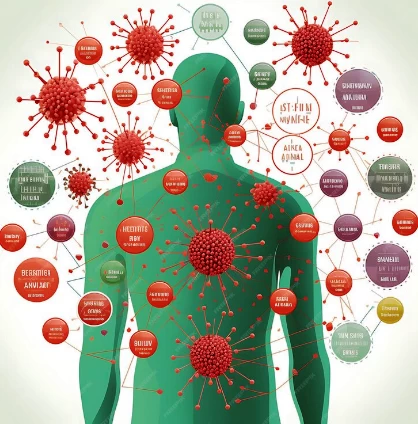
Infection and Immunity
- Infection and Immunity
- Infection and Immunity
- So, how can we individually improve and maintain our immunity?
- What do we do in our clinic?
Infection and Immunity
With the cooling weather and the reopening of schools, respiratory infections, among other infections, have become more common. Despite implementing measures to minimize the spread of Covid-19 since its diagnosis, emergency rooms are still filling up with patients exhibiting symptoms like fever and cough. Why are so many people getting sick? Why do some people never get sick, while others get sick so frequently that it disrupts their daily lives? Individual differences in the immune system are crucial at this point, but this is often overlooked or treated as if it doesn't exist.
First, let's clarify the terms mutation and variant. Mutation means a random change in genetic material. All living organisms instinctively want to ensure the survival of their species. Sexual reproduction produces offspring with three different sets of genes, half from the mother and half from the father. As environmental conditions change, those who can adapt to the new environment, not necessarily the strongest, survive and ensure the continuation of the species. Asexual reproducing organisms like bacteria and viruses change their genetic material through mutation to create new variants that can adapt to the environment. Here, the goal of the bacteria or virus is not to kill the host, but rather to ensure its own species' survival within the environment. So, why do some infections become more deadly for some people? Why did some people remain unaffected while thousands of others were lost during the early stages of the Covid-19 pandemic?
The primary cause of deaths is the dysfunction of the immune system, meaning it doesn't function correctly. This dysfunction can be seen as a weaker response in individuals who have received cancer chemotherapy, organ transplants, or immune-suppressing drugs for autoimmune or rheumatic diseases. These individuals are aware that they are more susceptible to infections and take more careful precautions to prevent transmission. However, dysfunction often manifests as an overactive immune response, causing harm to the body itself.
Imagine a scenario in the middle of a city where terrorists and soldiers are engaged in armed conflict, and the soldiers have very powerful weapons. If the order is to eliminate the enemy at any cost, during this conflict, nearby houses, vehicles, and buildings will inevitably be damaged. This is exactly what happens in a cytokine storm, which is essentially an immune system overreaction. During the Covid-19 pandemic, many of our patients were lost due to the cytokine storms they experienced. When we can keep our immune system at an optimal level, even if we encounter an infection, our immunity can overcome it, and we can continue our lives without getting sick. This not only provides individual benefits but also disrupts transmission, providing societal benefits as well.

So, how can we individually improve and maintain our immunity?
- Proper nutrition: Whether it's infections or chronic diseases, the first step should always be to improve nutrition. Not eating enough vegetables can lead to a loss of probiotic bacteria that act as a protective shield. Consuming excessive amounts of processed, refined, and carbohydrate-rich foods can promote the proliferation of harmful bacteria, viruses, and fungi. According to TÜİK data, the percentage of people who consumed vegetables at least once a day decreased from 69.4% in 2010 to 41.2% in 2022. This not only complicates the fight against infections but also paves the way for chronic diseases.
- Adequate sleep: At least 8 hours of sleep is required for proper detox phases.
- Exercise: Regular exercise increases muscle tissue, speeds up metabolism, prevents fat accumulation in the liver and other internal organs, promotes the production of new nerve cells in the brain, prevents the accumulation of waste materials inside cells, stimulates the production of NAD needed for energy production in mitochondria, and ensures the smooth functioning of mitochondria, making it easier to fight chronic diseases and infections.
- Avoid unnecessary antibiotic use: The most common infections in the community are upper respiratory tract infections, and more than 90% of them in adults and over 70% in children are viral. Antibiotics only kill bacteria. When you use antibiotics during a viral infection, you can kill not the viruses but the probiotic bacteria that surround your body like a shield. When there are gaps in your protective shield, it becomes easier for pathogens, bacteria, viruses, and fungi to make you sick again. You get sick again, take antibiotics again, then get another new infection. It's a vicious cycle.
- Maintain the balance between Omega-3 and Omega-6: Omega-3 fatty acids have anti-inflammatory, antioxidant, pain-relieving, and cancer-protective effects, while Omega-6 fatty acids are pro-inflammatory, oxidative, pain-promoting, and pave the way for chronic symptoms such as cancer, diabetes, Alzheimer's, and hypertension. Active Omega-3 fatty acids are found in hunted sea fish, grass-fed animal meat and dairy products, and free-range chicken meat and eggs. Omega-6 fatty acids are found in seed oils such as sunflower, canola, corn, and cottonseed, as well as in the meat of grain-fed animals and the meat and eggs of grain-fed chickens. The optimal ratio of Omega-3 to Omega-6 is 1/2, but both insufficient Omega-3 intake and excessive Omega-6 consumption have raised this ratio to 1/50 or even higher. When there is too much Omega-6 and too little Omega-3, inflammation cannot be limited. The body's response to infection is more severe and prolonged than necessary.
- Get enough Vitamin D: When taken in appropriate doses during the winter months, Vitamin D can be crucial in preventing infections and fighting them.
- Adequate exposure to infrared light: About 50% of sunlight consists of infrared rays. Infrared heat enhances detox capacity, prevents osteoporosis, and protects the body from chronic diseases and infections. Reduced exposure to sunlight in winter makes it easier for infections to occur.
- Get enough Vitamin C: Vitamin C enters cells using the same pathway as sugar, and sugar is more inclined to enter cells than Vitamin C. So the claim that eating fruits is enough to get Vitamin C is not correct. Vitamin C is the most powerful antioxidant circulating in the blood. Insufficient levels increase the risk of frequent infections, premature aging signs in the skin, weakened bone tissue, and osteoporosis. Especially in the winter months, getting enough Vitamin C is extremely important in preventing infections.
- Maintain high levels of glutathione: Glutathione is the most important intracellular antioxidant. It prevents the accumulation of toxic waste inside cells, removes free oxygen radicals, and supports the production of adequate energy in mitochondria. When glutathione levels are low, the risk of chronic diseases, cancer, and susceptibility to infections increases.
- Medical detox: Besides glutathione, there are many micronutrients inside and outside cells that increase our antioxidant capacity, such as alpha-lipoic acid, NAD, choline, Vitamin E, and B vitamins. When these nutrients are deficient, detox mechanisms work inadequately, making it easier to catch infections. Replacing the missing micronutrient is essential in fighting infections.
Avoid smoking and alcohol: Smoking increases our chemical load, and alcohol is directly toxic to liver cells, leading to direct cell death and fatty liver. In both cases, free oxygen radicals cannot be eliminated from the body, making it harder to fight infections.
What do we do in our clinic?
First, we try to identify the source of the problem with a detailed examination.
We conduct a full-body scan using the bioresonance method to identify accumulated toxins and deficiencies in vitamins and micronutrients.
We support medical detox by administering intravenous supplements of deficient micronutrients such as glutathione, Vitamin C, alpha-lipoic acid, B vitamins, choline, NAD, ginkgo biloba, etc.
Using treatments like ozone sauna and andulation, we support the final phase of detox, promoting the fight against chronic diseases and infections while preventing signs of premature aging.
Whether it's infections, chronic diseases, or preventing aging, taking preventive measures as early as possible increases the chances of success. As the philosopher and strategist Sun Tzu, who also wrote the book "The Art of War," said, excellence is not winning every battle by fighting, but rather winning without fighting. Preventing infections from occurring is the best gift you can give yourself.






